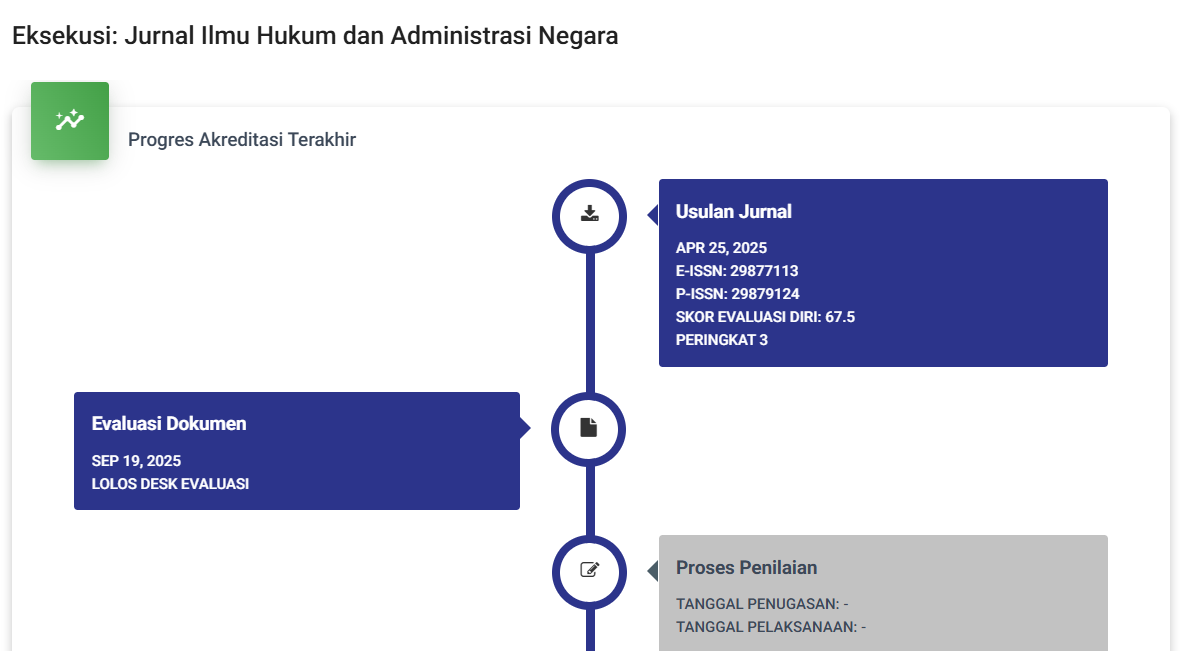Dampak Kebijakan Pengelolaan Sampah Sebagai Parameter Kinerja Pemerintah Dalam Bidang Lingkungan Hidup
DOI:
https://doi.org/10.55606/eksekusi.v1i3.444Keywords:
Environment, Government, Waste ManagementAbstract
Law No. 18 of 2008 on Waste Management is an example of the government’s efforts to protect the environtment by managing waste in an integrated and comprehensive manner. The waste generation that is getting out of control and the lack of public knowledge to manage waste is one of the unresolved problems. This study uses empirical legal research methods that are descriptive and through a qualitative approach. The type of data used is secondary data sourced from literature studies. The data collection techniques used in this research were document studies, observations and interviews. The results of this study are that waste management such as waste recycling by the community cannot fully run optimally, this can result in the amount of waste generation increasing from year to year. Obstacles in controlling waste generation due to the absence of specific standards in limiting the amount of waste generation, besides that there are still many landfills that do not meet the standards set by the government. The government in conveying information about waste management to the public has not been fully optimal, the government and the community should work together to build communication to find solutions to waste problems.
References
Candrakirana, R. (2015). Penegakan Hukum Lingkungan Dalam Pengelolaan Sampah Sebagai Pengembangan Prinsip Tata Kelola Lingkungan Di Kota Surakarta. Di 581 | Yustisia (Vol. 4, Edisi 3). https://doi.org/10.20961/yustisia.v4i3.8690
Henriyani, E. (2019). Problematika Dalam Implementasi Kebijakan Publik. Moderat: Jurnal Ilmiah Ilmu Pemerintahan, 1(4), 657-666.
Kurniawan, D. A., & Santoso, A. Z. (2020). Pengelolaan Sampah di daerah Sepatan Kabupaten Tangerang. ADI Pengabdian Kepada Masyarakat, 1(1), 31-36. https://doi.org/10.34306/adimas.v1i1.247
Mahyudin, R. P. (2017). Kajian permasalahan pengelolaan sampah dan dampak lingkungan di TPA (Tempat Pemrosesan Akhir). Jukung (Jurnal Teknik Lingkungan), 3(1). https://doi.org/10.20527/jukung.v3i1.3201
Mulasari, S. A., Husodo, A. H., & Muhadjir, N. (2014). Kebijakan pemerintah dalam pengelolaan sampah domestik. Kesmas: Jurnal Kesehatan Masyarakat Nasional (National Public Health Journal), 8(8), 404-410. https://doi.org/10.21109/kesmas.v8i8.412
Nawi, R., & Umar, Z. (2019). Reinventing Government in Analysis Model of Bureaucracy Service Policy in Indonesia. Opcion, 22(35), 2899–2921.
Pemerintah Indonesia. 2008. Undang-Undang Nomor 18 Tahun 2008 tentang Pengelolaan Sampah. Sekretariat Negara. Jakarta.
Pratama, R. A., & Ihsan, I. M. (2017). Peluang penguatan bank sampah untuk mengurangi timbulan sampah perkotaan studi kasus: bank sampah Malang. Jurnal Teknologi Lingkungan, 18(1), 112-119. https://doi.org/10.29122/jtl.v18i1.1743
Putri Damayanti, G., Waluyo, W., & Candrakirana, R. (2023). Pengelolaan Sampah Melalui PLTSa Di Indonesia Untuk Mewujudkan Net Zero Emission. PLEDOI (Jurnal Hukum Dan Keadilan), 2(1), 79–92. https://doi.org/10.56721/pledoi.v2i1.193
Romdoni, M., WN, S. F., & Nurdiansyah, R. (2022). Impact Of Political Policy On The Implementation Of Law Enforcement. Mediation: Journal of Law, 67-74.
Ramdhani, A., & Ramdhani, M. A. (2017). Konsep umum pelaksanaan kebijakan publik. Jurnal Publik: Jurnal Ilmiah Bidang Ilmu Administrasi Negara, 11(1), 1-12.
Rifani, D. N., & Jalaluddin, A. M. (2019). Pengelolaan Sampah Secara Bersama: Peran Pemerintah Dan Kesadaran Masyarakat. Jurnal Paradigma (JP), 7(1), 45-54.








